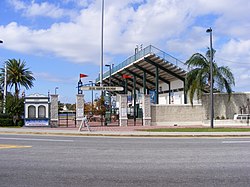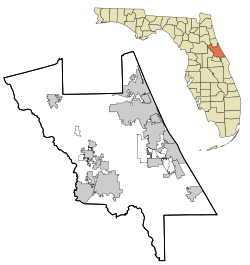User:Gamweb/sandbox2
The Jackie Robinson Ballpark (also known as Jackie Robinson Stadium or City Island Ball Park) is a historic baseball field in Daytona Beach, Florida, United States. It is located at 103 East Orange Avenue on City Island, in the Halifax River.
Jackie Robinson Ballpark | |
City Island Ball Park | |
 Entrance to Jackie Robinson Ballpark | |
| Location | Daytona Beach, Florida |
|---|---|
| Coordinates | 29°12′34″N 81°1′0″W / 29.20944°N 81.01667°W |
| Built | 1915 (ball field) 1929 (grandstand) |
| NRHP reference No. | 98001253 |
| Added to NRHP | October 22, 1998 |
 A game between Bethune-Cookman University and Florida A&M University at the stadium | |
| Former names | Daytona City Island Ballpark (1914 - 1990) |
|---|---|
| Location | 105 E. Orange Ave Daytona Beach, FL 32114 |
| Capacity | 4,200 |
| Field size | Left Field: 315 ft Left Center Field: 385 ft Center Field: 400 ft Right Center Field 385 ft Right Field: 325 ft |
| Opened | June 4, 1914 |
| Tenants | |
| Daytona Cubs (FSL) (1993-present) Bethune-Cookman Wildcats Montreal Expos (MLB) (spring training) (1973-1980) | |
Overview
[edit]The stadium, originally known as City Island Ball Park, was built in 1914 and holds 4,200 people. It is the home of the Daytona Cubs and the Bethune-Cookman Wildcats. The Daytona Cubs were founded in 1993. They have won four Florida State League championships, 1994, 2000, 2004 and 2008.
The Bethune-Cookman Wildcats have also achieved recent success, including six consecutive Mid-Eastern Athletic Conference (MEAC) baseball championships from 1999-2004, and five more in 2006-2010.
History
[edit]One reason the stadium is named for Jackie Robinson is the fact that Daytona Beach was the first Florida city to allow Robinson to play during the 1946 season's spring training. Robinson was playing for the Triple-A Montreal Royals, who were in Florida to play an exhibition game against their parent club, the Brooklyn Dodgers. Both Jacksonville and Sanford refused to allow the game due to segregation laws. Daytona Beach permitted the game, which was played on March 17, 1946. This contributed to Robinson breaking the Major Leagues' color barrier the following year when he joined the Dodgers. The refusal by Jacksonville, previously the Dodgers' spring training home, led the team to host spring training in Daytona in 1947 and build Dodgertown in Vero Beach for the 1948 season. A statue of Robinson is now located at the south entrance to the ballpark.
The ballpark was previously the home field of the Daytona Beach Islanders (1920–24, 1936–41, 1946–66, 1977), Daytona Beach Dodgers (1968–73), and Daytona Beach Astros (1978-84). The major league Montreal Expos conducted their spring training at the park from 1973-80.
On October 22, 1998, the stadium was added to the U.S. National Register of Historic Places. This property is part of the Daytona Beach Multiple Property Submission, a Multiple Property Submission to the National Register.
The stadium sustained heavy damage during Hurricane Donna in 1960. A $2 million historic renovation project was accelerated after Hurricane Floyd ripped off the metal roofs over the seating in 1999. In 2004, the ballpark suffered moderate damage during Hurricane Charley, causing several home games to be moved to Melching Field at Conrad Park in nearby DeLand
References
[edit]- http://books.google.com/books?id=nCTwAAAAMAAJ&pg=PA14&dq=%22Daytona+ball+park%22&hl=en&ei=X6GxTdX-KcS4tgeHjZHjAw&sa=X&oi=book_result&ct=result&resnum=1&sqi=2&ved=0CEIQ6AEwAA#v=onepage&q=%22Daytona%20ball%20park%22&f=false
- http://books.google.com/books?id=1DaQ8oNXuE0C&pg=PA192&dq=%22Daytona+ballpark%22+-inpublisher:icon&hl=en&ei=DaCxTY38FJSUtwf14ZDnCw&sa=X&oi=book_result&ct=book-preview-link&resnum=1&ved=0CDMQuwUwAA#v=onepage&q=%22Daytona%20ballpark%22%20-inpublisher%3Aicon&f=false
- http://books.google.com/books?id=RZCwAAAAIAAJ&q=%22Daytona+ball+park%22&dq=%22Daytona+ball+park%22&hl=en&ei=X6GxTdX-KcS4tgeHjZHjAw&sa=X&oi=book_result&ct=result&resnum=2&sqi=2&ved=0CEcQ6AEwAQ
- http://books.google.com/books?id=F3QQbDSdmg4C&pg=PA39&dq=%22ruth+law%22+baseball&hl=en&ei=7aaxTda8BKuC0QHEvf2fCQ&sa=X&oi=book_result&ct=result&resnum=1&ved=0CDIQ6AEwAA#v=onepage&q=%22ruth%20law%22%20baseball&f=false
- http://books.google.com/books?id=DxTZdZ2xc2EC&pg=PA193&dq=%22ruth+law+baseball%22&hl=en&ei=JaaxTc73IdC2tgfm_pXrCw&sa=X&oi=book_result&ct=result&resnum=5&sqi=2&ved=0CEgQ6AEwBA#v=onepage&q&f=false
External links
[edit]Volusia County listings at nationalregisterofhistoricplaces.com
- Jackie Robinson Ballpark from the Daytona Cubs website
- Florida's Office of Cultural and Historical Programs
- Jackie Robinson Ballpark Views - Ball Parks of the Minor Leagues

